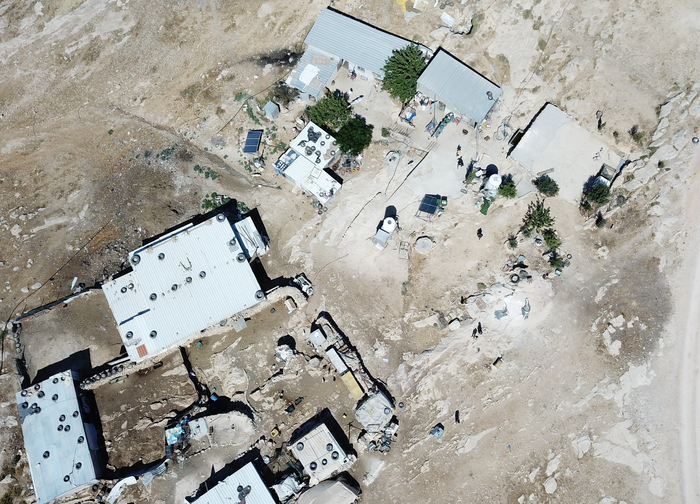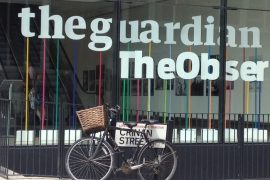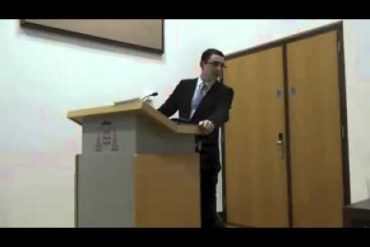A Guardian podcast on the issue involving over 1,000 Palestinians living within the 8,150 acres in what’s known as Masafer Yatta, in the South Hebron hills, within Israeli controlled Area C of the West Bank, is another example of their promotion of the Palestinian cause under the guise of journalism.
The area in question – eight hamlets, mostly collections of low-slung homes with makeshift roofs – has received a lot of media attention since Israel’s Supreme Court last month ended a twenty year legal fight between residents and the state. The court ruled (Hebrew), in a 9-0 decision, that the Palestinian petitioners hadn’t proved that they lived in the villages as permanent residents before the army declared the area an army training zone (known as Firing Zone 918) in the early 1980s, and that they only occasionally entered the area during seasonal migration. So, legally, they have no rights to the land.
The Guardian audio report, (“Life in the firing zone: the occupation of Masafer Yatta”, June 13), by their Jerusalem correspondent Bethan McKernan and Nosheen Iqbal, host of the Guardian’s Today in Focus podcast, a follow-up on McKernan’s article on the topic that we responded to here, maligned Israel for most of the thirty-four minute show.
At two minutes in, listeners are told by Iqbal, as if it was an undisputed fact, that the Palestinian residents have been living there (in Masafer Yatta) for “generations”, contradicting the Supreme Court’s ruling.
At three minutes in, Iqbal mentions the court ruling’s response to accusations that evictions of Palestinians would violate the Geneva Convention, saying, “In an unprecedented move, the court ruled the Geneva Convention, which stops the forced transfer of people under occupation did not apply and that Israel law trumped international law”.
However, the court ruled that “the point of the 4th Geneva Convention was to prevent the expulsion of populations in an occupied area for the purpose of their elimination or forced labour or for political/state aims – which is not the case here”. Indeed, the Palestinians in question are not being “transferred” from the West Bank in any sense of the word, but narrowly face eviction from specific residences within the territory.
At eight minutes in, McKernan – after being asked by Iqbal for some background on the West Bank – describes Area C of the West Bank as representing “the most brutal aspects of the occupation”, inaccurately claims that settlers routinely “take-over private Palestinian land” with the IDF’s acquiescence, and then says that, in contrast with the settlers, Palestinians there “aren’t allowed to connect to the water system”.
However, it is only illegal buildings and/or communities that are not connected to the water system, representing a small fraction of the overall Palestinian population in Area C. The Guardian journalist makes no effort to make this important distinction.
McKernan is then asked by Iqbal about the history of Israel’s declaration of the area as a firing zone, to which she responds by citing a government ministerial meeting from 1981 in which (then Agricultural Minister) Ariel Sharon “explicitly proposed creating a firing zone in this area specifically to drive the Palestinians from the land”. Again, this is a lie, one that she peddled in her previous article.
As we noted in our previous post, the actual minutes of the meeting in question show Sharon saying the following:
“I want to tell the representatives of the general staff, we want to offer you additional training areas. Additional training areas must be closed in at the border, [between] the bottom of the Hebron Hills and the Judean Desert. In light of that phenomenon – the spreading of the Arab villagers on the mountainside toward the desert.”
Clearly, Sharon said the purpose was to prevent the spread of Arab villages towards the area in question. He didn’t say anything about “forcing [existing] local Palestinians from their homes” as the Guardian claims, as – consistent with the court’s findings – prior to 1980, there were no permanent residents in the area. Despite this fact, McKernan, several times throughout the broadcast, tells listeners that the families of Masafer Yatta have lived there “generation after generation”.
At 19 minutes in, McKernan talks about settler violence against Palestinians, and then mentions Palestinian violence, but frames it thusly: “Sometimes Palestinians do fight back violently. For example, just last year a settler was killed on his way home from the settlement of Homash in the north of the West Bank”.
However, the Israeli victim, Yehuda Dimentman, 25, who left behind a wife and toddler, had done nothing to the three Palestinian perpetrators, two of whom were members of the terror group Palestinian Islamic Jihad, for which they were ‘fighting back’. McKernan framed the cold-blooded murder of an innocent Israeli civilian by members of an antisemitic terror group as an arguably understandable revenge attack.
Asked by Iqbal again about the court case, and whether the Palestinian petitioners supplied evidence of land ownership, McKernan claimed that they indeed “presented documents and paperwork [to the court] going back to the British mandate…in some cases going back to the Ottoman empire. They also presented satellite pictures showing there were clearly people living in this area….and residents in jinba say their family has lived there since the Ottoman empire…”.
However, page 11 clause 26 of the court ruling contradicted this. (Translation of the Hebrew by CAMERA UK):
To the plaintiffs, who did not attach any sort of document according to which they have rights to lands in the firing zone, was issued an eviction order from the zone.
And, clause 46 of the ruling stated:
The plaintiffs could not prove their claim of permanent residence before the declaration of the firing zone.
Towards the end of the podcast, McKernan responds to Iqbal’s query about where Palestinians from Masafer Yatta will go if and when they’re evicted, by saying, firmly and defiantly, in a way an activist would, “they are not going anywhere”. Listeners are not told that, reportedly, out of 49 families mentioned in the petition, at least 38 were identified as permanent residents of the nearby village of Yatta or other villages – meaning that, if they are evicted, they won’t be homeless or be traveling very far at all.
Finally, throughout the podcast, McKernan used words “incredible”, “resilient” and “inspiring” to describe the Palestinians of Masafer Yatta. And, in one revealing segment, speaks of one Palestinian named Mohammed who refuses to leave the village, because, she says, in her own voice, “he knows the land is his“, failing to add to make clear that it’s Mohammed’s opinion that the land is his, as an opposed to an established fact. It’s as if, for McKernan, the decision by Israel’s Supreme Court – though praised internationally for its independence – is completely irrelevant and assumed to be illegitimate.
Related Post
Indy accepts false Palestinian claim on Jerusalem building permits





